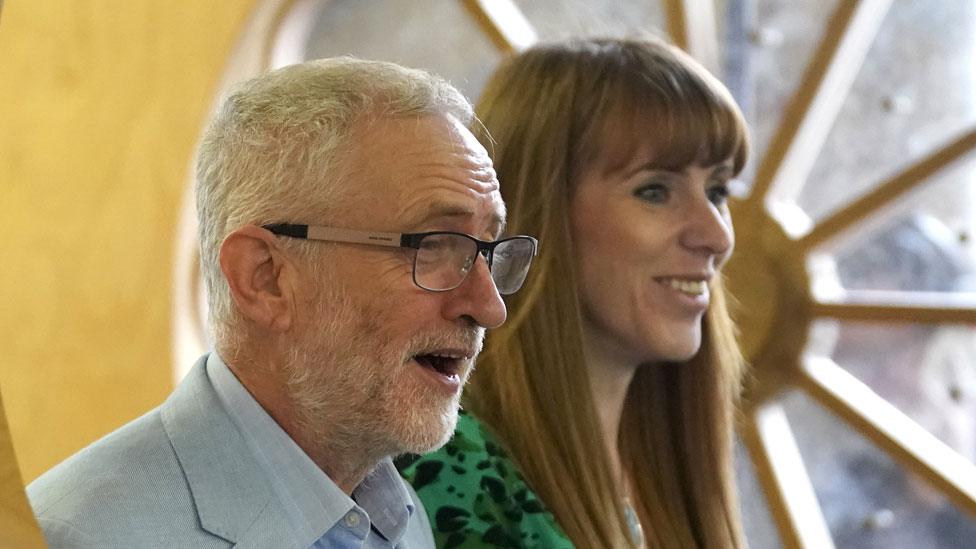Labour promises free jobs retraining for adults
- Published
- comments
Jeremy Corbyn: "Labour’s 'national education service' will offer people free education as a right for all."
Labour is promising a £3bn plan to offer adults in England free access to retraining to help their job chances and to tackle skills shortages.
Shadow education secretary Angela Rayner wants to "throw open the door" to adults wanting to learn new skills.
The Lib Dems are promising a £10,000 training grant for each adult, which it calls a "skills wallet".
The Conservatives have a National Retraining Scheme for adults needing to update their skills for work.
With concerns about automation threatening jobs and warnings from employers about a lack of skilled staff, the political parties are setting out their stalls for adult education and retraining.
'Too expensive'
The CBI business group welcomed making training a priority, saying: "Adult participation in education is at its lowest for two decades."
The Edge vocational education charity warned the current skills shortage was costing UK businesses £4.4bn per year.
On Tuesday, Labour's election campaign set out plans to spend an extra £3bn per year to provide free access to vocational learning for adults - which it hopes will reach an extra 300,000 people per year.

Angela Rayner and Jeremy Corbyn will promise more support for training for jobs
Ms Rayner says it will help people "who want to change career, are made redundant or didn't get the qualifications they needed when they were younger".
"For many, adult education is too expensive, too time-consuming or too difficult to get into," she says.
Labour would offer adults up to six years of training, such as for vocational qualifications in the healthcare and engineering sectors or adults wanting to go back to college to get academic qualifications.
Employees would also have a right to paid time off for education and training and there are promises to improve careers advice for adults.
'Change the culture'
Speaking on BBC Radio 4's Today programme, Ms Rayner said she wanted to "change the culture" so that "learning is part of everyday life, rather than something that is done to you at a particular point".
It was a "long overdue investment", she said, improving the skills of young people and adults, rather relying on skilled workers from abroad.
The shadow education secretary said access to adult education would be open to all and would be "free at the point of use" without means testing, with funding to come from changes to taxes for high earners and businesses.
Ms Rayner also restated Labour's commitment to scrapping tuition fees for university students in England. "We will abolish tuition fees, no ifs, no buts."
She rejected concerns from vice chancellors about whether university funding would be protected, accusing them of receiving "wild amounts" of pay, and saying they were paid much more than the prime minister.
Labour leader Jeremy Corbyn says education should be "like an escalator running alongside you throughout life, that you can get on and off whenever you want".
'Skills wallet'
The Liberal Democrats have put forward their plans for adult education - based on the idea of individuals having a "skills wallet" to pay for training, with government funding being available to be drawn down at different stages of life.
At the age of 25, there would be £4,000 put into the skills wallet, £3,000 at the age of 40 and then £3,000 at the age of 55.
The Lib Dems say the policy will cost £1.6bn per year by 2024-25.
"In an ever changing workplace, people often need to develop new skills but the cost of courses and qualifications shuts too many people out," Lib Dem business spokesman Sam Gyimah says.

Sam Gyimah, of the Lib Dems, has promised adults individual funding for their learning needs
The Conservatives in government have begun to test plans for a National Retraining Scheme, supported by £100m announced in last year's Budget.
This is intended to help people train for changing jobs and alternative careers if their jobs are threatened by automation.
There are some local pilot tests for the retraining scheme, available to adults without degrees in low-income jobs.
It is scheduled to be rolled out more widely in 2020.
The Conservatives also highlighted their plans for new vocational qualifications, called T-levels.
Education Secretary Gavin Williamson said Labour was "making promises that it simply won't be able to fulfil".
'Sorely neglected'
But Jo Grady, leader of the UCU lecturers' union, warned of "steep falls" in numbers of adult students.
"For too many years, adult learning has been a sorely neglected part of our education system," she said.

Gavin Williamson says Labour is making promises they "won't be able to fulfil"
Neil Bates, who chairs the Edge vocational educational charity, said employers would want to tackle the £4.4bn cost of skills shortages - and individuals needed to have the skills for "secure, well paid, sustainable jobs".
The chief executive of the Learning and Work Institute, Stephen Evans, who was a member of Labour's Lifelong Learning Commission, warned that currently "the number of adults taking part in learning at its lowest levels on record".
"Worse still, it is the adults who could most benefit from access to training opportunities who are least likely to participate," he said.
Employers have complained of skills shortages and Matthew Fell, the CBI's chief policy director, said it was important "lifelong learning is rising to the top of the political agenda".
He said businesses would also welcome support for technical education and giving it a status "on par with academic learning".


All the parties know their record on adult education is pretty poor, writes Sophie Hutchinson.
According to the Institute for Fiscal Studies, in the past 15 years, overall spending on classroom-based courses has fallen by two-thirds, as have the number of adult learners.
The adult education budget fell by 32% between 2003-04 and 2009-10 under Labour and by a further 47% from 2009-10 to 2018-19 under the coalition and the Conservatives.
Labour now says it would reverse that and more, coming close to doubling the current adult education budget, taking it back to levels similar to 2003.
The Lib Dems also want a boost to lifelong learning - with a "skills wallet" for money for adults to spend on learning.
But there will be a challenge ensuring this is spent on genuine courses - as a previous Individual Learning Account scheme faced widespread fraud.
- Published11 November 2019

- Published2 August 2019

- Published18 July 2019

- Published7 March 2018
